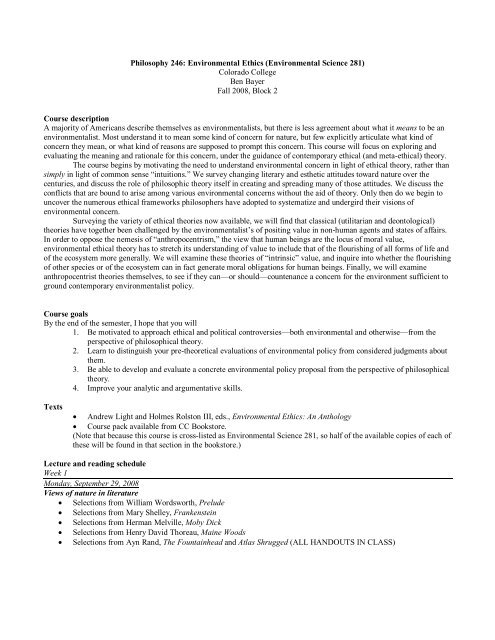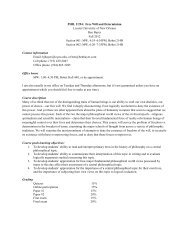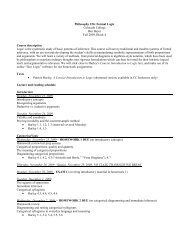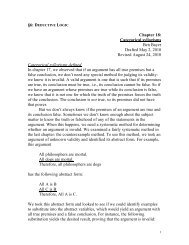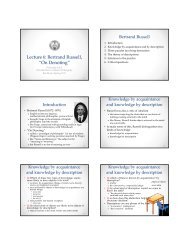Philosophy 246: Environmental Ethics ... - BenBayer.com
Philosophy 246: Environmental Ethics ... - BenBayer.com
Philosophy 246: Environmental Ethics ... - BenBayer.com
Create successful ePaper yourself
Turn your PDF publications into a flip-book with our unique Google optimized e-Paper software.
<strong>Philosophy</strong> <strong>246</strong>: <strong>Environmental</strong> <strong>Ethics</strong> (<strong>Environmental</strong> Science 281)<br />
Colorado College<br />
Ben Bayer<br />
Fall 2008, Block 2<br />
Course description<br />
A majority of Americans describe themselves as environmentalists, but there is less agreement about what it means to be an<br />
environmentalist. Most understand it to mean some kind of concern for nature, but few explicitly articulate what kind of<br />
concern they mean, or what kind of reasons are supposed to prompt this concern. This course will focus on exploring and<br />
evaluating the meaning and rationale for this concern, under the guidance of contemporary ethical (and meta-ethical) theory.<br />
The course begins by motivating the need to understand environmental concern in light of ethical theory, rather than<br />
simply in light of <strong>com</strong>mon sense “intuitions.” We survey changing literary and esthetic attitudes toward nature over the<br />
centuries, and discuss the role of philosophic theory itself in creating and spreading many of those attitudes. We discuss the<br />
conflicts that are bound to arise among various environmental concerns without the aid of theory. Only then do we begin to<br />
uncover the numerous ethical frameworks philosophers have adopted to systematize and undergird their visions of<br />
environmental concern.<br />
Surveying the variety of ethical theories now available, we will find that classical (utilitarian and deontological)<br />
theories have together been challenged by the environmentalist’s of positing value in non-human agents and states of affairs.<br />
In order to oppose the nemesis of “anthropocentrism,” the view that human beings are the locus of moral value,<br />
environmental ethical theory has to stretch its understanding of value to include that of the flourishing of all forms of life and<br />
of the ecosystem more generally. We will examine these theories of “intrinsic” value, and inquire into whether the flourishing<br />
of other species or of the ecosystem can in fact generate moral obligations for human beings. Finally, we will examine<br />
anthropocentrist theories themselves, to see if they can—or should—countenance a concern for the environment sufficient to<br />
ground contemporary environmentalist policy.<br />
Course goals<br />
By the end of the semester, I hope that you will<br />
1. Be motivated to approach ethical and political controversies—both environmental and otherwise—from the<br />
perspective of philosophical theory.<br />
2. Learn to distinguish your pre-theoretical evaluations of environmental policy from considered judgments about<br />
them.<br />
3. Be able to develop and evaluate a concrete environmental policy proposal from the perspective of philosophical<br />
theory.<br />
4. Improve your analytic and argumentative skills.<br />
Texts<br />
Andrew Light and Holmes Rolston III, eds., <strong>Environmental</strong> <strong>Ethics</strong>: An Anthology<br />
Course pack available from CC Bookstore.<br />
(Note that because this course is cross-listed as <strong>Environmental</strong> Science 281, so half of the available copies of each of<br />
these will be found in that section in the bookstore.)<br />
Lecture and reading schedule<br />
Week 1<br />
Monday, September 29, 2008<br />
Views of nature in literature<br />
Selections from William Wordsworth, Prelude<br />
Selections from Mary Shelley, Frankenstein<br />
Selections from Herman Melville, Moby Dick<br />
Selections from Henry David Thoreau, Maine Woods<br />
Selections from Ayn Rand, The Fountainhead and Atlas Shrugged (ALL HANDOUTS IN CLASS)
Tuesday, September 30, 2008<br />
The development of modern environmentalism<br />
William Cronan, “The Trouble with Wilderness: Or, Getting back to the Wrong Nature” (part 1, pp. 7-17)<br />
(COURSE PACK pp. 1-6))<br />
Optional: Ronald Rees, “The Scenery Cult: Changing Landscape Tastes over Three Centuries” (COURSE PACK<br />
pp. 14-17)<br />
David Pepper, selections from “Modern Roots of Ecocentrism” (COURSE PACK pp. 19-46)<br />
Wednesday, October 1, 2008<br />
Conflicting intuitions about the environment<br />
William Cronan, “The Trouble with Wilderness” (part 2, pp. 17-25) (COURSE PACK pp. 6-10)<br />
o The Economist, “Out of the Wilderness,”<br />
http://www.economist.<strong>com</strong>/world/unitedstates/displaystory.cfm?story_id=11707142<br />
o The Undercurrent, “The <strong>Environmental</strong>ist Attack on Outdoorsmanship,”<br />
http://the-undercurrent.<strong>com</strong>/paper/the-environmentalist-attack-on-outdoorsmanship/<br />
Ramachandra Guha, “Radical American <strong>Environmental</strong>ism and Wilderness Preservation: A Third World Critique,”<br />
http://www.eci.ox.ac.uk/~dliverma/articles/Guha%20on%20radical%20environmentalism.pdf<br />
Eric Katz, “Is there a Place for Animals in the Moral Consideration of Nature” (part 1, LR pp. 85-90)<br />
Thursday, October 2, 2008<br />
Methodology of environmental ethics<br />
Richard Sylvan, “Is there a Need for a New, an <strong>Environmental</strong>, Ethic?” (LR pp. 47-52)<br />
Mathew Humphrey, “Intuition, Reason, and <strong>Environmental</strong> Argument” (part 1, pp. 45-60) (COURSE PACK PP. 47-<br />
55)<br />
Friday, October 3, 2008<br />
FIRST SHORT PAPER DUE<br />
Fundamental positions on environmental ethics<br />
Andrew Light and Holmes Rolston III, “Introduction: <strong>Ethics</strong> and <strong>Environmental</strong> <strong>Ethics</strong>” (LR pp. 1-11)<br />
Clare Palmer, “An Overview of <strong>Environmental</strong> <strong>Ethics</strong>” (LR pp. 15-34)<br />
Week 2<br />
Monday, October 6, 2008<br />
Utilitarian (hedonic consequence-based) animal liberation ethics<br />
Brief excerpts from Jeremy Bentham and John Stuart Mill (COURSE PACK pp. 63-67)<br />
Peter Singer, “Not for Humans Only: The Pace of Nonhumans in <strong>Environmental</strong> Issues”? (LR pp. 55-63)<br />
Tuesday, October 7, 2008<br />
Rights-based animal liberation ethics<br />
Tom Regan, “Animal Rights: What’s in a Name?” and extract from The Case for Animal Rights (pp. 65-73)<br />
Diana Hsieh, Critique: “Animal Wrongs” (COURSE PACK pp. 69-76 )<br />
Wednesday, October 8, 2008<br />
Teleological biocentric ethics<br />
Paul Taylor, “The <strong>Ethics</strong> of Respect for Nature” (LR pp. 74-84)<br />
John O’Neill, Critique: “The Varieties of Intrinsic Value” (LR pp. 131-40)<br />
Thursday, October 9, 2008<br />
Teleological ecocentric ethics<br />
Aldo Leopold, “The Land Ethic” (LR pp. 38-46)<br />
Holmes Rolston III, “Value in Nature and the Nature of Value” (LR pp. 143-52)<br />
Optional: Eric Katz, “Is There a Place for Animals in the Moral Consideration of Nature?” (part 2, pp. 90-93)<br />
Harley Cahen, Critique: “Against the Moral Considerability of Ecosystems” (LR pp. 114-23)
Friday, October 10, 2008<br />
READING/WRITING DAY: SECOND SHORT PAPER DUE<br />
Week 3<br />
Monday, October 13, 2008<br />
Teleological anthropocentric ethics<br />
Harry Binswanger, “Life-based Teleology and the Foundations of <strong>Ethics</strong>” (COURSE PACK pp. 113-22)<br />
Tara Smith, “Principled Egoism: The Only Way to Live” (COURSE PACK pp. 123-36)<br />
Tuesday, October 14, 2008<br />
Holistic self-realization ecocentric ethics: “Deep ecology”<br />
Warwick Fox, “Deep Ecology: A New <strong>Philosophy</strong> for Our Time?” (LR pp. 252-8)<br />
Arne Naess, “The Deep Ecological Movement: Some Philosophical Aspects” (LR pp. 262-73)<br />
Mathew Humphrey, Critique: “Intuition, Reason, and <strong>Environmental</strong> Argument” (part 2, pp. 60-72) (COURSE<br />
PACK pp. 55-61)<br />
Wednesday, October 15, 2008<br />
Deontological (rational act-based) environmental ethics<br />
Brief excerpts from Immanuel Kant (COURSE PACK, pp. 79-82 )<br />
Onora O’Neill, “<strong>Environmental</strong> Values, Anthropocentrism, and Speciesism” (COURSE PACK, pp. 83-90)<br />
Allen Wood, “Kant on Duties regarding Nonrational Nature” (COURSE PACK, pp. 91-100)<br />
Thursday, October 16, 2008<br />
EXAM<br />
Friday, October 17, 2008<br />
<strong>Environmental</strong> virtue (agent-based) ethics<br />
Bernard Williams, “Must a Concern for the Environment by Centered on Human Beings?” (COURSE PACK pp.<br />
137-41)<br />
Thomas Hill, Jr., “Ideals of Human Excellence and Preserving Natural Environments” (COURSE PACK pp. 143-<br />
49)<br />
Holmes Ralston III, Critique: “<strong>Environmental</strong> Virtue <strong>Ethics</strong>: Half the Truth but Dangerous as a Whole” (COURSE<br />
PACK pp. 151-59)<br />
Week 4<br />
Monday, October 20, 2008<br />
Pragmatist anthropocentric ethics<br />
Bryan G. Norton, “<strong>Environmental</strong> <strong>Ethics</strong> and Weak Anthropocentrism” (LR pp. 163-73)<br />
Eugene Hargrove, Critique: “Weak Anthropocentric Intrinsic Value” (LR pp. 175-87)<br />
Tuesday, October 21, 2008<br />
Pragmatist pluralistic ethics<br />
John Dewey, “Reconstruction in Moral Conceptions” (COURSE PACK pp 161-7)<br />
Antony Weston, “Beyond Intrinsic Value: Pragmatism in <strong>Environmental</strong> <strong>Ethics</strong>” (LR pp. 307-17)<br />
J. Baird Calicott, Critique: “The Case against Moral Pluralism” (pp. 203-16)<br />
Wednesday, October 22, 2008<br />
READING/WRITING DAY: THIRD PAPER DUE


